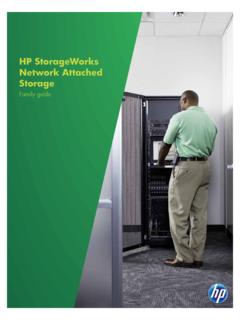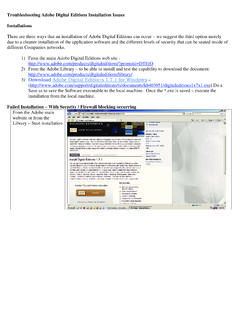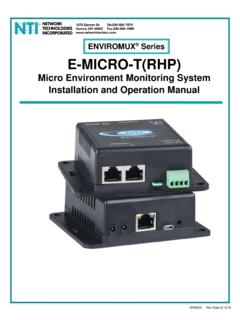Transcription of STOP. THINK. CONNECT. Online Safety Quiz - …
1 STOP. think . connect . Online Safety quiz Round 1: Safety and Security Kristina is on Facebook and receives a friend request from a boy she doesn't know. What should she do? A. Accept the friend request. It's rude to ignore him. B. Deny the friend request. C. Send him a message and ask him how he knows her. B. Deny the friend request. A friend is someone you know and trust and have interacted with over time. When you create passwords, you should make them easy to guess. (True or False). FALSE. You should create passwords or use passphrases (a group of words) that are easy to remember, BUT hard to guess. Make your passwords long, strong and unique by using a combination of upper and lowercase letters, numbers and symbols. Don't use the same password for different accounts.
2 Write your passwords down and keep them in a safe place away from your computer. Hector unlocks his smartphone and notices he has 12. apps that need to be updated. What should he do? A. Ignore the prompt to update . B. Update the apps. B. Update the apps. It's important to Keep a Clean Machine. Keeping a Clean Machine means having the latest operating system, software, web browser, anti-virus protection and apps on your computer and mobile devices. You should also only have apps on your phone that you actually use. You don't have to worry when you visit your favorite sites, like Facebook and gaming sites, because they are safe from spyware, malware and other Online threats. (True or False). FALSE. Trusted sites can be safer. However, what you do on those sites such as clicking on posts with links or using apps.
3 Can put you at risk. The best security step you can take is to Keep a Clean Machine. Keeping a Clean Machine means having the latest operating system, software, web browser, anti-virus protection and apps on your computer and mobile devices. Remember, when in doubt, throw it out! Links in email, tweets, posts, and Online advertising are often the way cybercriminals compromise your computer. If it looks suspicious, even if you know the source, it's best to delete or if appropriate, mark as junk email. When Online , you should be careful whenever approached by a new person or asked to provide information about yourself. (True or False). TRUE. You always need to be on the lookout for Online intruders! Be careful because they may be trying to get information from or about you.
4 Remember to Be Web Wise and think before you act. Be wary of communications that implore you to act immediately, offer something that sounds too good to be true, or ask for personal information. You receive an email from a person that identifies themselves as your friend John. They want to meet you in the park after school. Do you: A. Tell your parents about the email and ignore the request. B. Ask the person a question only John would know to make sure it is John. C. Go to the park and meet your friend John. A . Tell your parents about the email and ignore the request. Some people will pretend to be other people and may be impersonating someone you know. It's better to be safe than sorry! Unfamiliar email addresses and posts on social network sites should raise a red flag.
5 Let your parents know and let them help you make the right decision about contacting John. You should always know who you're talking to Online . (True or False). TRUE. The Internet can be a place to meet people and join new communities. But just because you meet someone Online , it doesn't mean you really know their identity. Use caution when interacting with new people. There is nothing wrong with being suspicious and extremely guarded about sharing any personal information. You receive a chain email that tells you to pass it on to 10 of your closest friends. Do you: A. Send the email to your friends it's so cool and you want them to see it too! B. Delete the email. You're never sure what viruses these types of chain emails can have.
6 B. Delete the email. You're never sure what viruses these types of chain emails can have. When in doubt, throw it out! Links in email, tweets, posts, and Online advertising are often the way cybercriminals compromise your computer. If it looks suspicious, even if you know the source, it's best to delete or if appropriate, mark as junk email. Malware is a type of software designed to cause viruses. (True or False). TRUE. Malware, short for malicious software, is designed to cause damage or disruption to a computer system or to use a computer to send spam, distribute malware or launch an attack on other computers. You can avoid malware by Keeping a Clean Machine and having the latest operating system, software, web browser, anti-virus protection and apps on your computer and mobile devices.
7 Remember, all devices that connect to the Internet need protection. When it comes to Online shopping, you can safely shop from any site. (True or False). FALSE. When shopping Online , you should always shop from trusted and well-known websites and always with a parent or other adult present. When banking and shopping, check to be sure the sites is security enabled. Look for web addresses with https://, which means the site takes extra measures to help secure your information. Http:// is not secure. You should be aware of pop-ups and downloads. (True or False). TRUE. Pop-ups and downloads can contain viruses that could infect your computer. You can avoid viruses by Keeping a Clean Machine and having the latest operating system, software, web browser, anti-virus protection and apps on your computer and mobile devices.
8 You and a friend are on the computer, looking to download music and movies. You should: A. Go to a site that your friend uses and download a few files onto the computer. B. Only with your parent's permission, go to trusted websites or app stores to download music and movies. B. Only with your parent's permission, go to trusted websites or app stores to download music and movies. your friends may not know what websites are safe or unsafe for you to download. It's illegal to download music or movies from certain websites. Only purchase music and movies from established services for media distribution. Round 2: Privacy and Being a Good Online Citizen What is the best way to use Facebook, Tumblr, Instagram and other social networking sites?
9 A. Limit the amount of information I share about myself. B. Only talk to people I know. C. Make my page private, except to the people I have as my friends. D. All of the above. D. All of the above. Own your Online Presence. When available, set the privacy and security settings on websites to your comfort level for information sharing. It's ok to limit how and with whom you share information. You posted a picture Online , but soon decided to take it down. You are worried your friend may see it, but then soon remember that person DOES NOT have a computer. your friend will never see the photo. (True or False). FALSE. You never know who is going to see things that are posted Online . Even if your friend doesn't have a computer, there are many other ways he could see the photos after they have been shared with friends.
10 Copies could be passed around and someone may have saved an image before you deleted it. Be a good Online citizen. think about images you post and whether your friends would be okay with them. post only about others as you would have them post about you. Whenever possible, get permission before posting pictures or videos of others. Likewise, let others know they need your permission before posting pictures or videos of you. The great thing about the cyber world is that you can say things you might not always say directly to someone's face. (True or False). FALSE. Statements you make Online about people can be just as hurtful as saying them face-to-face. Being nice in the cyber world is equally as important as when you talk face to face.







